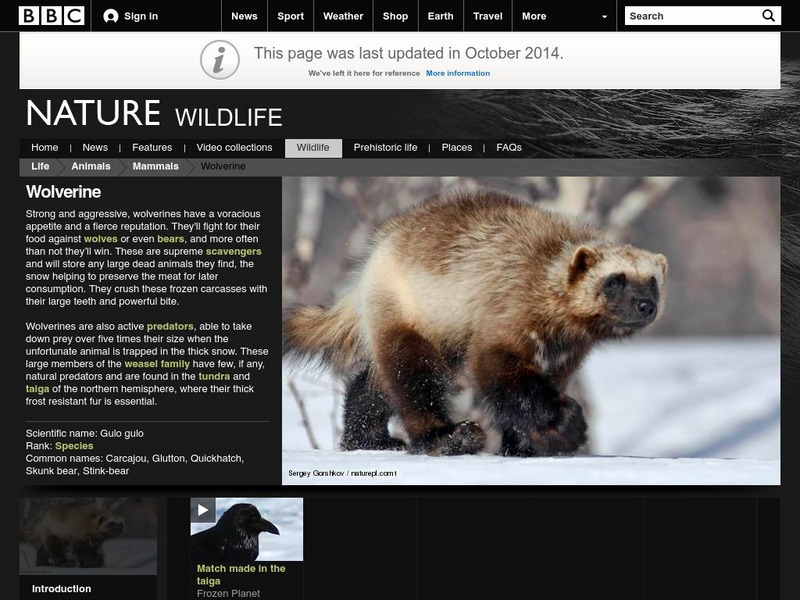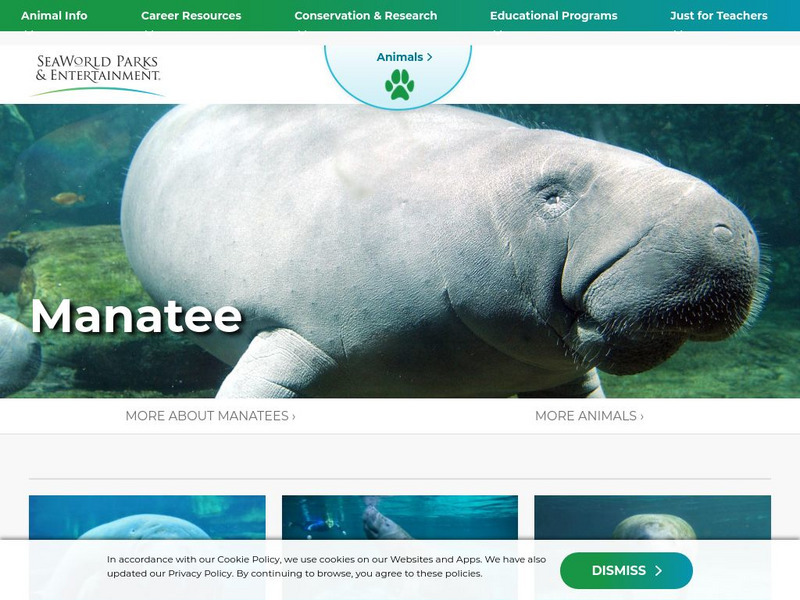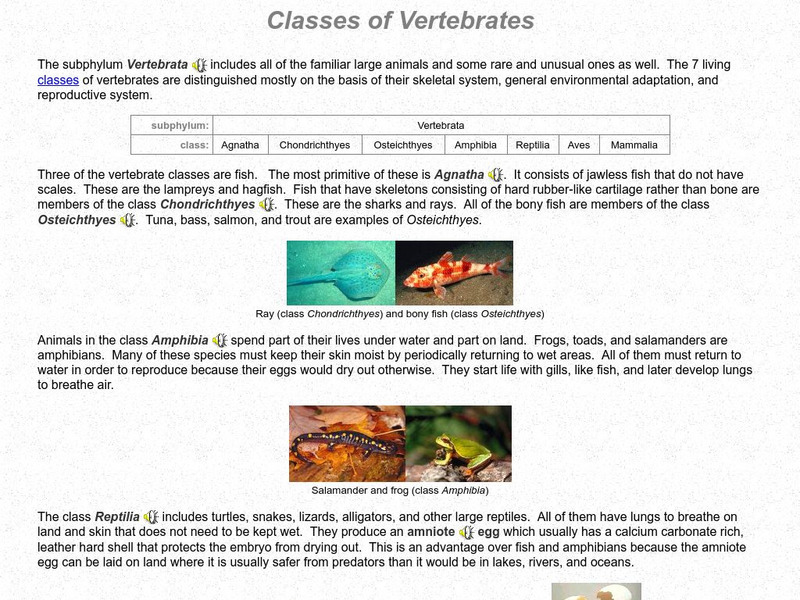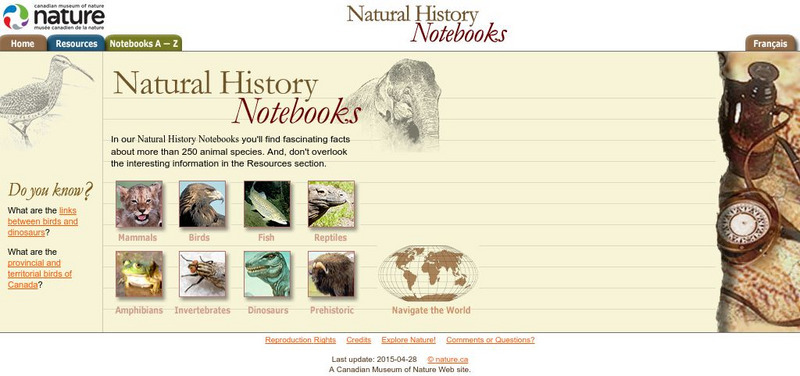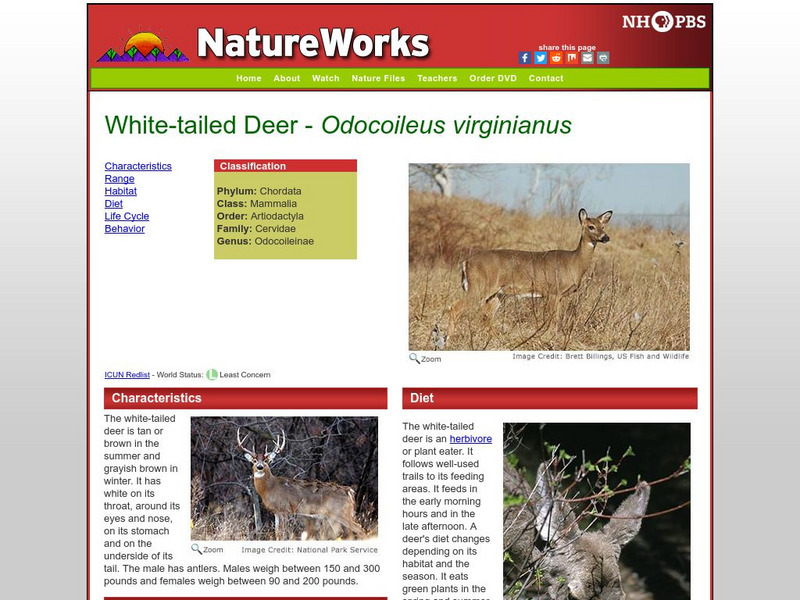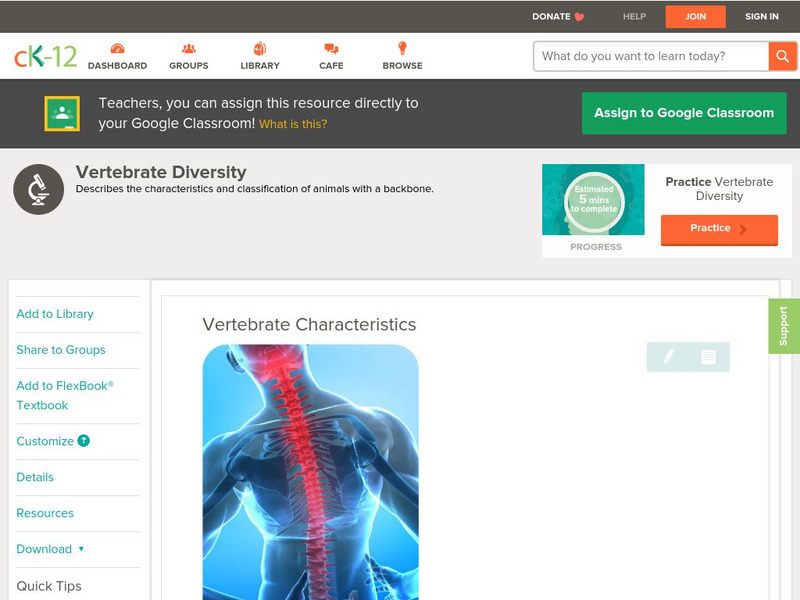BBC
Bbc Nature: Prehistoric Life: Irish Elk
Examine the enthralling world of the Irish elk by uncovering details about its behaviors, habitats, geological time periods, and classification through photos, a video, descriptions, and external links.
BBC
Bbc Nature: Prehistoric Life: Woolly Mammoth
Explore the exciting world of the woolly mammoth by discovering facts about its behaviors, habitats, geological time periods, and classification through news, photos, videos, descriptions, and external links.
BBC
Bbc Nature: Wildlife: Wolverine
Examine the fascinating world of the wolverine by learning facts about its distribution, habitats, behaviors, and classification through news, photos, a video, descriptions, and external links.
BBC
Bbc Nature: Wildlife: Three Toed Sloths
Examine the captivating world of the three-toed sloth by discovering facts about its distribution, habitats, behaviors, and classification through photos, videos, descriptions, and external links.
BBC
Bbc Nature: Wildlife: Bactrian Camel
Study the intriguing world of the Bactrian camel by discovering details about its behaviors, habitats, distribution, and classification through news, photos, videos, descriptions, and external links. Listen to the sound of a female...
Sea World Parks & Entertainment
Sea World: Manatees
Outlines the characteristics of the manatee, including classification, habitat, behaviors, and conservation. Helps students identify with manatees with a list of "Books for Young Readers." Information at a level of upper intermediate or...
Other
Science4 Us: Animals
In online and offline activities, students broaden their understanding of animals by learning to identify and classify animals into six categories: mammals, birds, fish, amphibians, reptiles, and invertebrates.
Palomar Community College District
Palomar College: Class
In the animal kingdom, there are seven living classes in the phylum Vertebrata. The Palomar College shares detailed information on each of these classes. Includes examples and photos as well as a follow-up quiz.
Sea World Parks & Entertainment
Sea World: Harbor Seals
Outlines the characteristics of the harbor seal, including classification, habitat, behaviors, and conservation. Helps students identify with seals with a list of "Books for Young Readers." Information at a level of upper intermediate or...
The Franklin Institute
The Franklin Institute: Living Things Families
What do centipedes and crabs have in common? What's so special about a backbone? Check this site out from The Franklin Institute if you are interested in biology and classification.
Canadian Museum of Nature
Canadian Museum of Nature: Natural History Notebooks
This site from the Canadian Museum of Nature, a natural history museum, provides short information blurbs and fun facts on over 240 different common animals categorized by type (mammals, fish, reptiles, invertebrates, amphibians,...
ClassFlow
Class Flow: Animal Classification
[Free Registration/Login Required] This is a flipchart for first graders to learn about mammals, fish, birds, amphibians and reptiles.
PBS
Nh Pbs: Nature Works: White Tailed Deer
Find out what makes the White-Tailed Deer unique when you explore this educational resource. This site identifies characteristics, life cycle, range, behavior, habitat and diet for this mammal.
Regents of the University of Michigan
Animal Diversity Web: Mule Deer
Comprehensive reference information about the North American mule deer. Includes taxonomic classification, specimens, and other details about this remarkably adaptable hoofed mammal.
PBS
Pbs Nature: Otters
Discover more about how otters live, what they eat and how they socialize when you visit this informative resource. This condensed site will benefit students who need help narrowing their research information.
PBS
Nh Pbs: Nature Works: California Ground Squirrel
Find out more about the California Ground Squirrel when you explore this educational resource. This site features information on the diet, habitat, characteristics, range, reproduction, and behavior of this mammal.
Canadian Museum of Nature
Canadian Museum of Nature: Giant Panda
The Canadian Museum of Nature provides a concise introduction to the giant panda. Find out all the basic facts about this rare mammal, including where it lives, what it eats, and even learn about some of the controversy that surrounded...
Wikimedia
Wikipedia: Dolphin
Wikipedia, a free and open-source encyclopedia, provides a detailed overview of dolphins. Content includes a focus on dolphin taxonomy, the evolution of dolphins, dolphin anatomy, dolphin behavior, feeding, dolphin lore, and more.
Sea World Parks & Entertainment
Sea World: Polar Bears
Outlines the characteristics of the polar bear, including classification, habitat, behaviors, and conservation. Helps students identify with polar bears with a list of "Books for Young Readers." Information at a level of upper...
CK-12 Foundation
Ck 12: Life Science: Vertebrate Characteristics
[Free Registration/Login may be required to access all resource tools.] Vertebrates are animals with backbones. These include fish, amphibians, reptiles, birds, and mammals. Learn more about vertebrate characteristics in this learning...
CK-12 Foundation
Ck 12: Life Science: Chordates
[Free Registration/Login may be required to access all resource tools.] Did you know that fish, amphibians, reptiles, birds, and mammals are all related? They are all chordates. Chordates are a group of animals that includes vertebrates,...
BBC
Bbc Nature: Prehistoric Life: Woolly Rhinoceros
Go on a journey with the extinct woolly rhino and learn about its behaviors, habitat, classification, and body structure.
BBC
Bbc Nature: Prehistoric Life: Sabre Toothed Tigers
Learn about the saber-toothed tiger and discover details about this prehistoric cat's behaviors, habitat, classification, and body structure through short videos and reading.
PBS
Nh Pbs: Nature Works: Moose
The moose is the largest member of the deer family and the largest mammal in North America. Students will find information on its range, habitat, life cycle, behavior, and diet.


